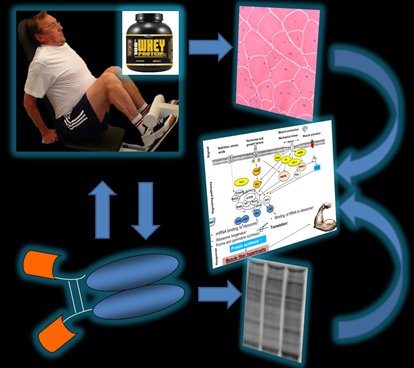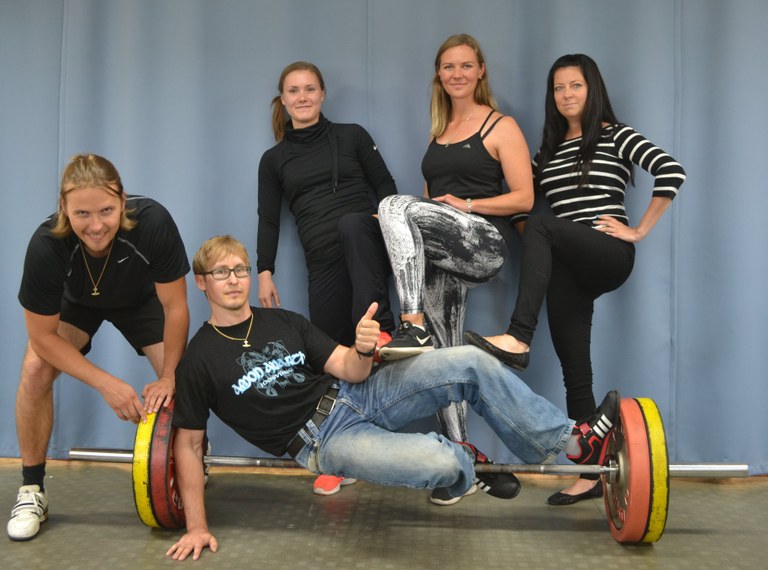
Education
2004 MSc: Exercise physiology (University of Jyväskylä, Finland)
2009 PhD: Exercise physiology (University of Jyväskylä, Finland). PhD Thesis
2013 Docent: Exercise physiology (University of Helsinki, Faculty of Medicine)
Past:
2005-2009 Doctoral Student
2010-2013 Academy of Finland Post Doctoral Researcher
2014-2019 Academy of Finland Research Fellow
Contact information
Faculty of Sport and Health Sciences
Neuromuscular Research Center and Gerontology Research Center
Biology of Physical Activity
University of Jyväskylä
Viveca 232, P.O. Box 35
40014 Jyväskylä, Finland
E-mail: juha. hulmi (at) jyu.fi
Main research interests
- Muscle hypertrophy
- Muscle atrophy/wasting/cachexia
- Sports nutrition
- Exercise physiology
- Muscle metabolism and signaling
- Strength/resistance training in young and older individuals
- Weight/fat loss in sports
Selected recent publications (others, see Pubmed):
As a PI or post doc (* = equal contribution)
Beltrà M*, Pöllänen N* … Hulmi JJ, Sartori R, Pirinen E, Penna F. NAD+ repletion with niacin counteracts cancer cachexia. Nature Communications. 14(1):1849, 2023.
Lautaoja JH, … Hulmi JJ, Ylä-Outinen L. Mimicking exercise in vitro – effects of myotube contractions and mechanical stretch on omics. American Journal of Physiology-Cell Physiology 324(4):C886-C892, 2023.
Isola V, Hulmi JJ, Petäjä P, Helms ER, Karppinen JE, Ahtiainen JP. Weight loss induces changes in adaptive thermogenesis in female and male physique athletes. Applied Physiology, Nutrition, and Metabolism. 48(4):307-320, 2023.
Lautaoja JH, ... Hulmi JJ. Higher glucose availability augments the metabolic responses of the C2C12 myotubes to exercise-like electrical pulse stimulation. Am J Physiol Endocrinol Metab. 2021 321(2):E229-E245.
Sarin HV, Perola M*, Hulmi JJ*. Mitochondrial bioenergetic pathways in blood leukocyte transcriptome decrease after intensive weight loss but are rescued following weight regain in female physique athletes.
FASEB J. 2021 35(4):e21484.
Nissinen TA, ... Hulmi JJ. Muscle follistatin gene delivery increases muscle protein synthesis independent of periodical physical inactivity and fasting. FASEB J. 2021 35(3):e21387.
Hulmi JJ et al. Muscle NAD+ depletion and Serpina3n as molecular determinants of murine cancer cachexia-the effects of blocking myostatin and activins. Mol Metab. 2020 41:101046.
Hentilä J, Hulmi JJ et al. Sprint and Strength Training Modulates Autophagy and Proteostasis in Aging Sprinters. Med Sci Sports Exerc. 2020
Lautaoja JH, ... Hulmi JJ. Muscle and serum metabolomes are dysregulated in colon-26 tumor-bearing mice despite amelioration of cachexia with activin receptor type 2B ligand blockade. Am J Physiol Endocrinol Metab. 2019; 316(5):E852-E865.
Sarin HV ... Kristiansson K*, Hulmi JJ*, Perola M*. Substantial fat mass loss reduces low-grade inflammation and induces positive alteration in cardiometabolic factors in normal-weight individuals. Scientific Reports 2019 9, 3450.
Wackerhage H, Schoenfeld BJ, Hamilton DL, Lehti M, and Hulmi JJ. Stimuli and sensors that initiate skeletal muscle hypertrophy following resistance exercise. Journal of Applied Physiology 2019 126, 30-43.
Nissinen T ... Hulmi JJ. Treating cachexia using sACVR2B-Fc improves survival, alters mTOR localization and attenuates liver and spleen responses. Journal of Cachexia Sarcopenia Muscle. 2018 9, 514-529.
Hentila J, Ahtiainen JP ... Hulmi JJ. Autophagy is induced by resistance exercise in young men but unfolded protein response is induced regardless of age. Acta Physiologica. 2018 224(1):e13069.
Hulmi JJ*, Nissinen T* et al. Prevention of chemotherapy-induced cachexia by ACVR2B ligand blocking has different effects on heart and skeletal muscle. J Cachexia Sarcopenia Muscle. 9, 417-432, 2018.
Hulmi JJ et al. The effects of intensive weight reduction on body composition and serum hormones in female fitness competitors. Frontiers in Physiology. January 10 2017.
Nissinen TA ... Hulmi JJ. Systemic blockade of ACVR2B ligands prevents chemotherapy-induced muscle wasting by restoring muscle protein synthesis without affecting oxidative capacity or atrogenes. Scientific Reports 6, 2016.
Räsänen M., … Hulmi JJ, Kivelä R, Alitalo K. VEGF-B gene therapy inhibits doxorubicin-induced cardiotoxicity by endothelial protection. Proc Natl Acad Sci U S A. 2016 113(46):13144-13149.
Ahtiainen J … Hulmi JJ, Häkkinen K. Resistance Training-Induced Adaptations in Muscle Size and Strength are Heterogeneous. Age 38, 10, 2016.
Hulmi JJ et al. The effects of whey protein with or without carbohydrates on resistance training adaptations. J Int Soc Sports Nutr. 12, 48, 2015.
Selected papers as a PhD student:
Hulmi JJ et al. Acute and long-term effects of resistance exercise with or without protein ingestion on muscle hypertrophy and gene expression. Amino Acids 37: 297-308, 2009.
Hulmi JJ et al. Resistance exercise and whey protein ingestion affects mTOR signaling pathway and myostatin in men. Journal of Applied Physiology, 106: 1720-1729, 2009.
Hulmi JJ et al. Post-exercise myostatin and activin IIb mRNA levels: effects of strength training. Medicine and Science in Sport and Exercise 39: 289-297, 2007.
Current or recently finished research projects as a PI or Co-PI

Academy of Finland 2014-2019 (publications until 2022). “Adequate muscle mass and aerobic capacity prolonging survival from muscle wasting: MassA”. I have been investigating the extent and mechanisms how adequate muscle mass and aerobic capacity can prolong survival from a catastrophe situation (muscle wasting). See publications: 1, 2, 3, 4, 5, 6, 7, 8, 9, 10, 11, 12, 13.
Muscle protein homeostasis: Proteostasis 2015-2020: This study investigated the effects of exercise, hypertrophy and atrophy on muscle protein homeostasis. See publications: 1, 2, 3, 4.
Fitness/physique sports and weight reduction 2015-. We study the effects of weight reduction on physiology and systems biology on fitness competitors. This study combines the skills from the experts of exercise and nutrition physiology, genetics, systems biology and sports psychology together. See publications: 1, 2, 3, 4, 5, 6, 7
In vitro exercise 2019-. We investigate using e.g. C-Pace EPS system the effects of in vitro muscle contraction on muscle metabolism and "exerkines". See publications: 1, 2.
Metabolic reprogramming in muscle atrophy and hypertrophy 2021-. This study investigates how parallel pathways to glycolysis are perhaps essential in maintaining or increasing muscle size in in vitro models.
Training, detraining and retraining in young individuals 2022-. We investigate physiological and molecular adaptations to resistance training, detraining and retraining when compared to control period and continuous resistance training.
Main research group in the Academy of Finland project (until 2019/2020):

A Group photo (23.8.2017) of my Academy of Finland project MassA. The Group is named "Another Group".
In the photo Jaakko Hentilä (now PhD), Juha Hulmi, Juulia Lautaoja (now PhD), Tuuli Nissinen (now PhD) and Anita Lampinen (was post doc). I have also supervised the PhD thesis of Heikki Sarin (now PhD) in the University of Helsinki (main supervisor Markus Perola) and of Vasco Fachada.
I am currently PhD supervisor of Eeli Halonen, Sakari Mäntyselkä, Ville Isola (main supervisor Juha Ahtiainen), Noora Pöllänen (main supervisor Eija Pirinen), Kialiina Tonttila (main supervisor Riikka Kivelä), Miika Wynne-Ellis (main supervisor Johanna Ihalainen) and Erik Niemi (main supervisor Riikka Kivelä).
More information
For more information, see my blog-page where I popularize science Lihastohtori (in Finnish).
You can also follow me on Facebook, Instagram, Google Scholar and LinkedIn and ResearchGate. Some of my appearances in media are listed here. Please also follow our @JYUBiolPA Twitter-account.
You should also check my Lihastohtori-books (In Finnish).
|